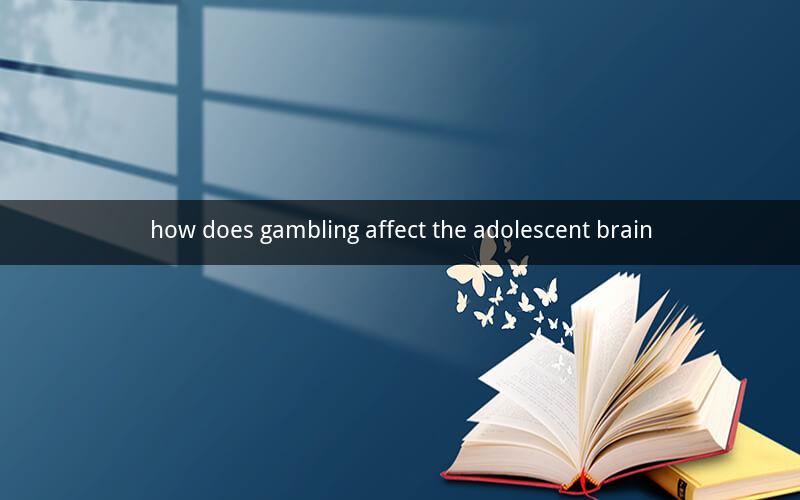
Table of Contents
1. Introduction to Adolescent Brain Development
2. Understanding the Adolescent Brain
3. The Role of Dopamine in Gambling
4. The Impact of Gambling on the Adolescent Brain
- Neuroplasticity and Reward Pathways
- Increased Risk-Taking Behavior
- Cognitive and Emotional Impairments
5. The Social and Psychological Consequences
6. Prevention and Intervention Strategies
7. Conclusion
1. Introduction to Adolescent Brain Development
Adolescence is a critical period of brain development, characterized by significant changes in cognitive, emotional, and social functioning. The brain undergoes rapid growth and reorganization during this time, which can make adolescents particularly vulnerable to certain influences, including gambling.
2. Understanding the Adolescent Brain
The adolescent brain is still maturing, particularly in areas responsible for decision-making, impulse control, and emotional regulation. This ongoing development makes adolescents more susceptible to the allure of gambling, which can lead to addictive behaviors and long-term consequences.
3. The Role of Dopamine in Gambling
Dopamine, a neurotransmitter associated with pleasure and reward, plays a crucial role in gambling. When adolescents engage in gambling activities, the release of dopamine can create a sense of euphoria and reinforce the desire to continue gambling.
4. The Impact of Gambling on the Adolescent Brain
- Neuroplasticity and Reward Pathways: The adolescent brain is highly neuroplastic, meaning it can change and adapt in response to experiences. Regular gambling can alter the brain's reward pathways, leading to a stronger association between gambling and pleasure.
- Increased Risk-Taking Behavior: The prefrontal cortex, responsible for decision-making and risk assessment, is still developing during adolescence. This can result in increased risk-taking behaviors, as adolescents may not fully understand the potential consequences of their actions.
- Cognitive and Emotional Impairments: Chronic gambling can lead to cognitive and emotional impairments, including difficulties with attention, memory, and emotional regulation. This can further exacerbate the risk of developing gambling-related problems.
5. The Social and Psychological Consequences
Gambling addiction can have severe social and psychological consequences for adolescents. These may include:
- Financial Problems: Gambling can lead to significant financial losses, which can cause stress and anxiety.
- Family and Relationship Issues: Gambling addiction can strain relationships with family and friends, leading to feelings of isolation and loneliness.
- Mental Health Issues: Gambling addiction is often associated with mental health problems, such as depression, anxiety, and substance abuse.
6. Prevention and Intervention Strategies
To mitigate the negative effects of gambling on the adolescent brain, several prevention and intervention strategies can be implemented:
- Education: Providing adolescents with information about the risks of gambling can help them make informed decisions.
- Support Systems: Encouraging the development of healthy coping mechanisms and support networks can help adolescents resist the allure of gambling.
- Intervention Programs: For those already affected by gambling addiction, specialized intervention programs can help them overcome their addiction and learn to manage their impulses.
7. Conclusion
The impact of gambling on the adolescent brain is a significant concern, as it can lead to a range of negative consequences. By understanding the risks and implementing effective prevention and intervention strategies, we can help protect the developing brains of adolescents and promote their overall well-being.
Questions and Answers
1. Q: How does gambling affect the brain's reward system in adolescents?
A: Gambling stimulates the release of dopamine, which creates a sense of pleasure and reinforces the desire to continue gambling, leading to alterations in the brain's reward pathways.
2. Q: Can gambling addiction lead to cognitive impairments in adolescents?
A: Yes, chronic gambling can cause difficulties with attention, memory, and emotional regulation, which are essential cognitive functions.
3. Q: What are some risk factors for developing a gambling addiction in adolescents?
A: Risk factors include family history of addiction, exposure to gambling, and certain personality traits, such as impulsivity and sensation-seeking.
4. Q: How can parents help prevent their children from developing a gambling addiction?
A: Parents can be proactive by monitoring their children's activities, discussing the risks of gambling, and setting clear boundaries regarding gambling behavior.
5. Q: Are there any effective treatments for adolescent gambling addiction?
A: Yes, specialized intervention programs, including cognitive-behavioral therapy and support groups, can be effective in treating adolescent gambling addiction.
6. Q: Can social media and online gambling contribute to adolescent gambling addiction?
A: Yes, the convenience and accessibility of online gambling can make it easier for adolescents to engage in risky gambling behaviors.
7. Q: How can schools contribute to the prevention of gambling addiction among adolescents?
A: Schools can implement educational programs about the risks of gambling and promote healthy coping mechanisms among students.
8. Q: What role does peer pressure play in adolescent gambling addiction?
A: Peer pressure can influence adolescents to engage in gambling, as they may feel pressured to conform to the behaviors of their peers.
9. Q: Can gambling addiction lead to other mental health issues in adolescents?
A: Yes, gambling addiction is often associated with mental health problems, such as depression, anxiety, and substance abuse.
10. Q: How can society address the issue of adolescent gambling addiction?
A: Society can address this issue by raising awareness, implementing stricter regulations on gambling, and providing resources for individuals affected by gambling addiction.